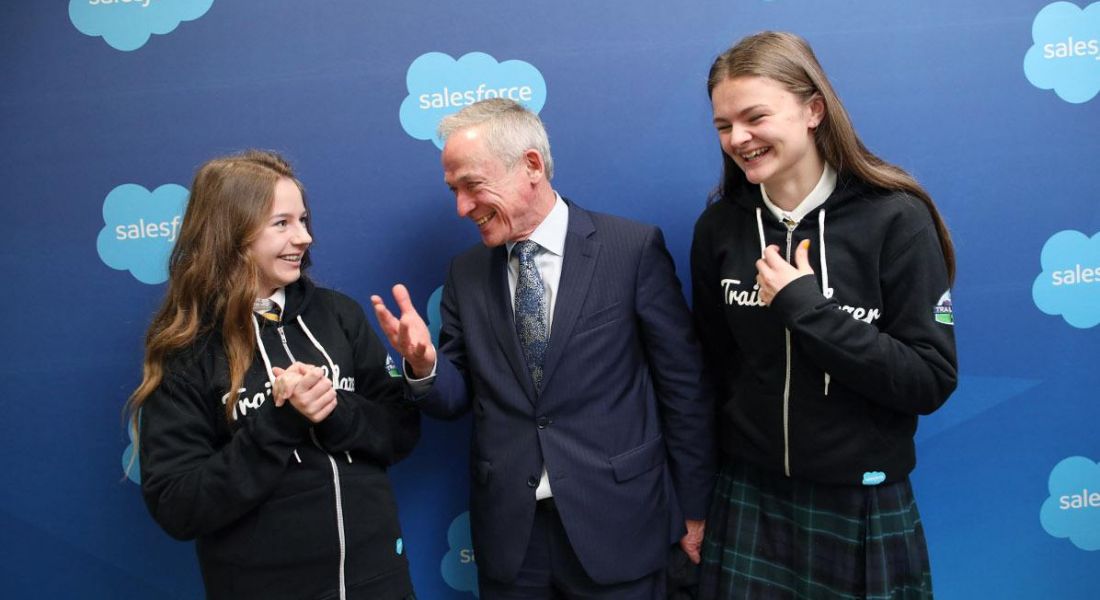As $100,000 is granted to Bridge 21, Salesforce’s country leader warns that 21st-century business requires people with 21st-century skills.
Cloud software giant Salesforce has provided a grant worth $100,000 to support the growth of the Bridge 21 CodePlus digital skills initiative.
The investment will aim to reach more than 5,000 Irish students through workshops and in-school talks.
‘We want to see our young people encouraged to participate in acquiring these key skills, both digital and broader STEM skills’
– DR DAVID DEMPSEY
CodePlus is an initiative from Bridge 21, based at Trinity College Dublin (TCD), designed to help address the underrepresentation of women in technology.
Salesforce has already worked with St Dominic’s Secondary School in Ballyfermot, St Peter’s Primary School in Bray and Citywise Education to support their STEM education programmes.
In response to questions from Siliconrepublic.com, Salesforce senior vice-president and country leader in Ireland, Dr David Dempsey, said that no other societal force has the potential to level the playing field as effectively as education.
“21st-century businesses require people with 21st-century skills – that is, people with strong, creative minds and, of course, digital literacy,” Dempsey said.
“Whether it’s at a large organisation such as Salesforce or a growing start-up, these needs will be the same. We want to see our young people encouraged to participate in acquiring these key skills, both digital and broader STEM skills. This should be done by developing STEM education programmes in a way that is fun and demonstrates their real-world application.”
A new approach
CodePlus takes a two-strand approach to addressing the issue of girls’ participation in tech. First, it provides in-depth, week-long, girl-only coding workshops, held on site or in partner schools; and secondly, through female computer engineers and IT professionals who visit all-girl schools to provide insights into careers in tech.
The $100,000 grant from Salesforce will help expand the reach of CodePlus, and will support staff, volunteer speaker training, data collection and analysis, teacher professional development, and equipment.
Prof Brendan Tangney from TCD’s School of Computer Science and Statistics said that it is not rocket science to know what tech companies – and indeed, most future employers – will be looking for in the years ahead.
“Tech companies are looking for two complementary sets of skills. Firstly, pure tech skills in software development etc. Secondly, the so-called 21st-century skills of teamwork, collaboration, problem-solving, communication and resilience.”
The big challenge, Tangney added, is how we can create a multiplier effect in Ireland.
“This is no doubt a big challenge, but professional development for teachers must be central to this. The Department of Education and Skills are halfway through a five-year strategy (The Digital Strategy for Schools 2015-2020), which is seeking to address this very topic. It includes a range of initiatives, most notable of which is the introduction of an ICT teaching competency framework (derived from a UNESCO one), which allows schools and teachers to benchmark themselves against a range of competencies.
“This framework is for use in both school self-evaluation on the one hand, and to inform training provided by the department on the other.”
Tangney also pointed to a second area of focus: the recently announced Digital Learning Clusters, which provide funding for bottom-up projects from clusters of schools with an emphasis on collaboration (possibly spanning primary and secondary) and with input from third level and industry.
“This offers an opportunity for meaningful and focused collaboration between the different parties to develop locally based initiatives. The nature of the collaboration between industry and schools is not fixed, and the hope is that innovative ideas will emerge which have the potential to scale.
“We – that is, everyone involved in and interested in educating our children – need to practice what we preach and model those skills of collaboration, problem-solving etc that we are asking students to develop in order to come up with creative ways to reimagine how we can enhance our school system to meet the challenges ahead and to exploit the enormous potential [that] technology is putting in the hands of the young generation.”
Tech firms can be force multipliers
From left: Jim Green, Salesforce; Minister Richard Bruton, TD; and Dr David Dempsey, Salesforce. Image: Julien Behal
Tangney said that the presence of tech giants can act as a force multiplier for digital skills.
“The partnership between Salesforce and CodePlus in Trinity College Dublin, involving both financial and volunteer support, is an example of the type of innovative collaboration that is needed. We are delighted to have the support of Salesforce.org, which will help us reach our goal of providing coding workshops to over 5,000 girls this year.
“The challenge is to take good ideas which have been validated in practice and to bring them to scale.
“Funding is an issue, of course, but more important is to have an ongoing public discussion between all stakeholders on the type of education system we should be developing so that we can make informed decisions and move at a quicker pace than education systems are used to,” Tangney said.




